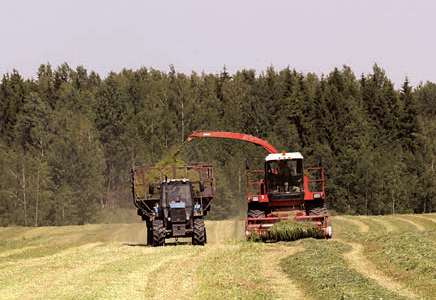The Government discusses the results of the socio-economic development of the country since the beginning of the year, alongside prospects of forecast fulfilment after the first six months of this year
Before the session of the Council of Ministers, journalists spoke to the Chair of the National Bank’s Board, Nadezhda Yermakova. What will happen to the Belarusian Rouble? “It’s better to think about forthcoming vacations rather than about the Rouble,” joked Ms. Yermakova, wearily. It seems that she has been asked this question often in the recent months. However, the country’s chief banker continued, “Everything is ok with our Rouble. Look, it has become known today that the Russian Rouble continued to strengthen and this is also good for our economy. I promise you that the monetary-credit policy of the National Bank won’t change. It will be smooth and quiet, with rates being reduced, but at a reasonable pace.”

Hot season for farmers
Belarus’ Prime Minister, Mikhail Myasnikovich spoke at the session about the state of the national economy, and immediately began with severe self-criticism, “I’d like to pay attention that the Council of Ministers needs to adopt prompt, quick and systematic measures in order to ‘unseam’ those ‘narrow places’ in economic development which exist, judging by the results of the last year and the beginning of 2014. We should admit that the Government fails to work in this manner.”
According to Mr. Myasnikovich, many evident decisions aren’t being accepted by the Government and such ‘non-acceptances’ can continue for quite long, “Everything is sinking in approvals and doubts. However, this happens not only in our Government, but also in the regional executive committees. I’d like that economic decisions were adopted more promptly at local levels.”
Moreover, the PM defined a whole range of approaches which should be taken as guidance. Actually, these principles have been recently specified by the President in his State of the Nation Address to Belarusian People and the Parliament. Therefore, if the ‘roadmap’ or major areas of economic development are clear on the whole, then only their implementation is left.
What should the Government pay attention to? According to Mr. Myasnikovich, the first point is recuperation and deep restructuring of the industrial complex. The results of the previous year and the current year show that this branch of the economy demonstrates very bad symptoms: “The traditional model of development of the industrial complex has currently run out of steam. The inter-departmental working groups, set up by the President, and aiming to solve problems in construction, agro-industrial complex and housing and utilities sector, propose a whole range of approaches which are designed to improve the activity of these branches. Meanwhile, neither the Economy Ministry nor the Industry Ministry have something to offer regarding industry — the leading branch of the economy — though the situation there is the most difficult. ”
A lot has been said about the problems in the agro-industrial sector, about the forthcoming forage harvesting, the protection of the internal market, the placement of production capacities in satellite towns and the monetary-credit sphere. Moreover, the Prime Minister spoke particularly on the issue of the availability of credit resources, “There’re no economic reasons in the country to maintain the interest rate for Belarusian Rouble deposits at such an over-extreme level. Taking into account the current level of inflation, rates of 39-40 percent per annum are not normal. In the meantime, gold-and-currency reserves may increase due to loans and reliance on the positive trade balance and the inflow of currency into the country, so we need to stop the malpractice of speculative rates.”
***
Judging by the latest data, the situation in the economy is evening up. During the first four months of the year, the Government has managed to bring GDP into the positive, and to improve the situation in industrial production, while also receiving a positive foreign trade balance. Meanwhile, this doesn’t mean that it’s time to rest on our laurels. On the contrary, important decisions are now expected from the economic staff that will enable us to develop positive tendencies. 










